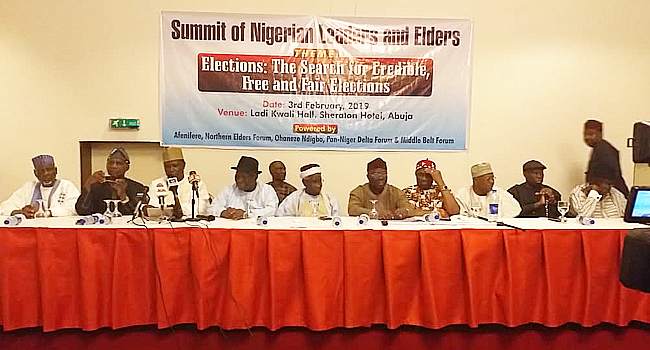There are no products in your shopping cart.
| 0 Items | £0.00 |

 PRESIDENT Muhammadu Buhari's campaign team have dismissed the recent endorsement of Alhaji Atiku Abubakar by several pan-cultural associations as their preferred candidate in this month's presidential elections as an irrelevance that will have no impact on the polls.
PRESIDENT Muhammadu Buhari's campaign team have dismissed the recent endorsement of Alhaji Atiku Abubakar by several pan-cultural associations as their preferred candidate in this month's presidential elections as an irrelevance that will have no impact on the polls.
In February 16, Nigeria will go to the polls to elect a new president with Alhaji Abubakar, the former vice president standing as the Peoples Democratic Party (PDP) candidate against the incumbent President Buhari. Last week, Alhaji Abubakar got a big boost when the leaders of five socio-cultural groups issued a joint communique after a meeting in Abuja, saying he was their adopted candidate.
Called the Forum of Nigerian Elders and Leaders, the associations said they were backing Alhaji Abubakar because President Buhari has steered the country towards insecurity, deep division and anarchy. Among the groups which signed the communique include Afenifere, the Northern Elders Forum (NEF), the Pan Niger Delta Forum (Pandef), Ohaneze Ndigbo and the Middle Belt Forum (MBF).
Their resolution was immediately welcomed by the Atiku camp who said the rare unity of prominent Nigerians across ethnic and religious divides would further energise him to lead the country to where neither tribe nor tongue would impair self-actualisation. According to the PDP, this declaration had fittingly positioned Atiku as the people’s candidate.
However, the APC campaign was dismissive of the endorsement, describing the chieftains of the groups as known PDP supporters and parasites who in time past, rode on the back of President Buhari for political relevance. In addition, the Buhari campaign called out the chieftains of the various socio-cultural groups to test their political clout by organising parallel rallies anytime the president has rallies in their zones.
In a communiqué issued at the end of the summit of the leaders drawn from the six-geopolitical zones, they revealed that they were left with no option than to adopt Atiku, given his political savvy, compared to the younger candidates in the contest. Among those who attended the Abuja meeting were Chief Ayo Adebanjo (Afenifere), Professor Ango Abdullahi (NEF), Chief Edwin Clark, (Pandef), Chief Nnia Nwodo (Ohaneze) and Dr. Bitrus Pogu (MBF).
Also present were Alhaji Tanko Yakassai, Professor ABC Nwosu, Alhaji Buba Galadima, Ambassador Yahaya Kwande, Dr Hakeem Baba-Ahmed and Dr Junaid Mohammed. The meeting acknowledged the existence of younger and highly qualified candidates but advanced reasons for its choice of Atiku.
Their communique read: “The forum, having concluded a thorough evaluation of all candidates aspiring to lead our nation through its current challenges and engineer genuine national rebirth, has decided to note that several of the younger candidates who presented themselves for the presidential election, demonstrated great capacity and promise to lead this country creditably and ensure that it engenders proper social and economic development to its people. However most of these qualified younger candidates do not, at present, have the machinery and structures to win a presidential election in Nigeria.
“Therefore, the forum adopts the candidate of the PDP, Alhaji Atiku Abubakar as the consensus candidate for the office of president of the Federal Republic of Nigeria as he has demonstrated the deep understanding of the critical need of the country at this time and possesses the capacity to proffer clear solutions in that respect. We call on all Nigerians, irrespective of religious or ethnic background to stand in unison and vote for Atiku Abubakar on the 16th of February 2019 and ensure that they defend their votes.”
In addition, the forum added that there is a national and international consensus that the 2019 elections must be credible and improve on the quality of the 2015 polls. It added that the Independent National Electoral Commission must be watched very closely and supported to set new, higher standards in election management, pointing out that the disposition of state agents that have responsibility for securing votes has also been a major source of concern.